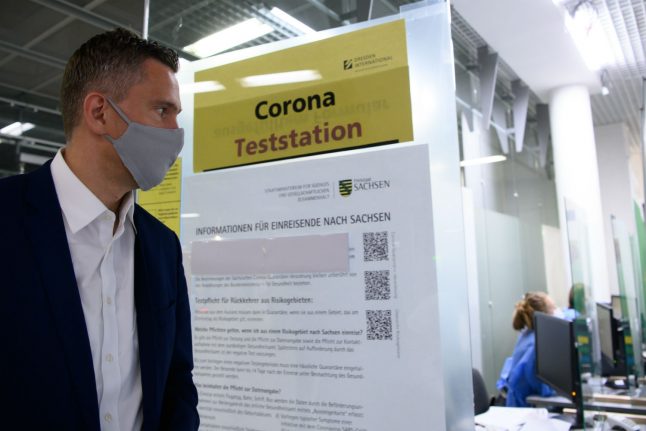What counts as a risk area?
Germany’s Robert Koch Institute (RKI) is continually updating its list of high-risk areas, which now includes several regions within Europe. In general, this applies to areas where there has been an incidence of more than 50 cases per 10,000 people in the population over the last seven days.
READ ALSO: These are the countries and regions on Germany's 'high risk' coronavirus list
Travellers coming to Germany by train, plane or by sea who have been in a risk area 14 days before their arrival are required to go directly to their home (or suitable accommodation).
This doesn’t apply, however, to those who have simply travelled through the risk area, without making any stops, as part of their journey.
A two week quarantine period follows, although in some cases this can be shortened when the traveller receives a medical certificate stating a negative test result.
To arrange a test in Germany, you can call the hotline for the medical appointment service at 116 117.
Can non-travellers also be ordered to quarantine?
Yes, if you've come into contact with a person with the coronavirus, or show typical symptoms of the virus (fever, shortness of breath, coughing, etc), you may be ordered to quarantine as a precautionary measure.
READ ALSO: Tell us: What's it like to receive a quarantine order in Germany?
What should you do if entering Germany from a risk area?
When returning from a risk area, you’re also required to let your local health office (Gesundheitsamt) know, and provide the address of where you’re staying.
Not sure who to contact? Simply plug your zip code (or Postleitzahl, or PLZ) into this tool from the RKI.
If requested by the health authority, you’ll need to either prove you have a negative coronavirus test or get tested within 10 days of your arrival.
Yet even if your test results are negative, you will be legally required to let your local health authority know if you develop symptoms of the virus within the next 14 days.
Can I receive a free test?
Up until September 15th, travellers arriving to Germany from any country – whether classified as a risk area or not – could receive a free test. But since then, free testing has only been available to those who spent time in a risk area up to 14 days before their entry to Germany.
They will qualify for the test – which is conducted at airports, ports, doctor’s surgeries and sometimes train stations, such as Berlin’s Hauptbahnhof – for up to 10 days after their return.
READ ALSO: What you need to know about Germany's plans for mandatory Covid-19 tests for returning travellers
Do children also need to be tested for the virus after returning from a risk area?
Yes, although the age at which testing begins varies based on the state.
Can the quarantine be lifted following a coronavirus test?
Travellers returning to Germany from a risk area qualify for a free coronavirus test. In some of Germany’s 16 states, those who test negative are able to forego the quarantine requirement.
However, you’ll need to check with the state where you’re visiting or staying. For more information, visit the German Foreign Ministry's continually updated website with guidance for incoming travellers.
Are there consequences for failing to quarantine?
Let’s first start with the short answer: Yes.
Anyone who has been to a risk area in Germany is required to let their local health authority know. Failing to do so, and follow the quarantine order they consequently receive, is punishable with a fine of up to €25,000 under the German Infection Protection Act (Infektionsschutzgesetz).
More stringent penalties are currently being discussed, including jail time, following an incident in which a local “superspreader” in Bavaria infected several people after disregarding a quarantine order.
READ ALSO: Why is Bavaria so concerned about impact of 'American super spreader'?



 Please whitelist us to continue reading.
Please whitelist us to continue reading.
Member comments